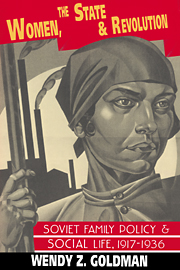Crossref Citations
This Book has been
cited by the following publications. This list is generated based on data provided by Crossref.
Ilic, Melanie
1994.
Soviet women workers and menstruation: A research note on labour protection in the 1920s and 1930s.
Europe-Asia Studies,
Vol. 46,
Issue. 8,
p.
1409.
Goldman, Wendy Z.
1996.
Industrial Politics, Peasant Rebellion and the Death of the Proletarian Women's Movement in the USSR.
Slavic Review,
Vol. 55,
Issue. 1,
p.
46.
Gorsuch, Anne E.
1996.
“A Woman is Not a Man”: The Culture of Gender and Generation in Soviet Russia, 1921-1928.
Slavic Review,
Vol. 55,
Issue. 3,
p.
636.
Lee, W. Robert
1997.
Reply: Case Studies Enough for a General Model?.
International Labor and Working-Class History,
Vol. 52,
Issue. ,
p.
58.
Rivkin-Fish, Michele
1999.
Sexuality education in Russia: defining pleasure and danger for a fledgling democratic society.
Social Science & Medicine,
Vol. 49,
Issue. 6,
p.
801.
Franks, Anton
and
Jones, Ken
1999.
Lessons from Brecht: a Brechtian approach to drama, texts and education[1].
Research in Drama Education: The Journal of Applied Theatre and Performance,
Vol. 4,
Issue. 2,
p.
181.
Attwood, Lynne
1999.
Creating the New Soviet Woman.
p.
115.
Schwanitz, Simone
1999.
Im Schatten demokratischer Legitimität.
p.
132.
Nethercott, Frances
1999.
Endings and ends in early Soviet philosophical culture: Plato'sRepublicin a Bolshevik utopia.
Intellectual News,
Vol. 4,
Issue. 1,
p.
55.
Attwood, Lynne
1999.
Creating the New Soviet Woman.
p.
1.
2001.
Re/presenting Class.
p.
56.
2001.
Re/presenting Class.
p.
182.
Chatterjee, Choi
2001.
Women in the Stalin Era.
p.
49.
2001.
Men without Women.
p.
73.
2001.
Re/presenting Class.
p.
247.
2001.
Re/presenting Class.
p.
206.
2001.
Re/presenting Class.
p.
1.
2001.
Re/presenting Class.
p.
227.
2001.
Men without Women.
p.
162.
2001.
Men without Women.
p.
327.





